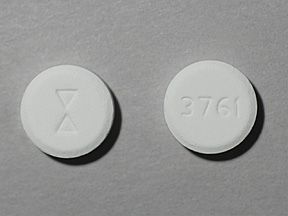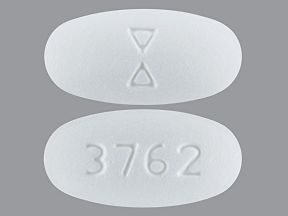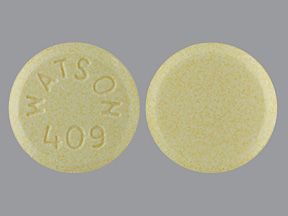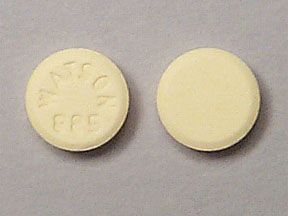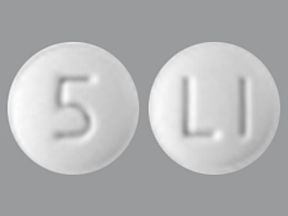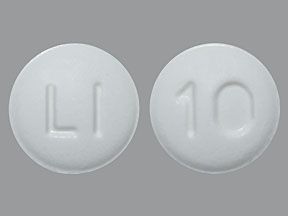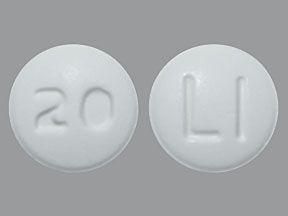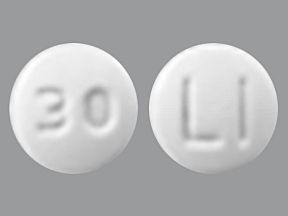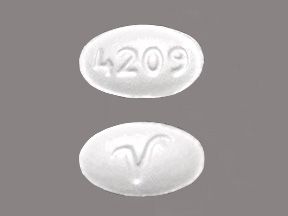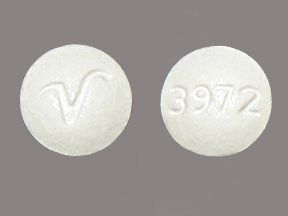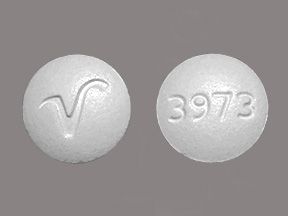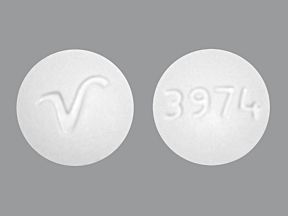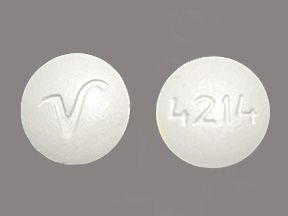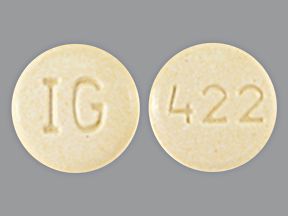Highlights for lisinopril
- Lisinopril oral tablet is available as both a generic and brand-name drug. Brand names: Prinivil and Zestril.
- Lisinopril comes as a tablet and a solution you take by mouth.
- Lisinopril oral tablet is used to treat hypertension (high blood pressure) and heart failure. It’s also used to improve your chance of survival after a heart attack.
This drug has a boxed warning. These are the most serious warnings from the Food and Drug Administration (FDA). A boxed warning alerts doctors and patients about drug effects that may be dangerous.
- You shouldn’t take this drug if you’re pregnant or plan to become pregnant. This drug can harm or be fatal to your unborn baby. If you get pregnant while taking this drug, tell your doctor right away. Talk to your doctor about other ways to lower your blood pressure during pregnancy.
- Angioedema (swelling): This drug can cause abrupt swelling of your face, arms, legs, lips, tongue, throat, and intestines. This can be fatal. Tell your doctor right away if you have swelling or abdominal pain. You’ll be taken off of this drug and possibly given medication to reduce your swelling. Swelling can happen at any time while you’re taking this drug. Your risk may be higher if you have a history of angioedema or if you are Black.
- Hypotension (low blood pressure): This drug can cause low blood pressure, especially during the first few days of taking it. Tell your doctor if you feel lightheaded, dizzy, or like you’re going to faint. You may be more likely to have low blood pressure if you:
- aren’t drinking enough fluids
- are sweating heavily
- have diarrhea or are vomiting
- have heart failure
- are on dialysis
- take diuretics
- Persistent cough: This drug may cause a persistent cough. This cough will go away once you stop taking the medication.
Lisinopril is a prescription drug. It comes as an oral tablet and an oral solution.
Lisinopril oral tablet is available as the brand-name drugs Prinivil and Zestril. It’s also available as a generic drug. Generic drugs usually cost less. In some cases, they may not be available in every strength or form as the brand-name version.
Why it’s used
Lisinopril oral tablet is used to treat high blood pressure and heart failure. It’s also used to improve your chance of survival after a heart attack.
This drug may be used as part of a combination therapy. That means you may need to take it with other drugs.
How it works
Lisinopril belongs to a class of drugs called angiotensin-converting enzyme (ACE) inhibitors.
A class of drugs is a group of medications that work in a similar way. They have a similar chemical structure and are often used to treat similar conditions.
This drug relaxes the blood vessels in your body. This reduces stress on your heart and lowers your blood pressure.
Lisinopril oral tablet does not cause drowsiness. However, it may cause low blood pressure. This can make you feel faint or dizzy. You shouldn’t drive, use machinery, or do other activities that require alertness until you know how this drug affects you. Lisinopril can also have other side effects.
More common side effects
The most common side effects that can occur with lisinopril include:
- headache
- dizziness
- persistent cough
- low blood pressure
- chest pain
If these effects are mild, they may go away within a few days or a couple of weeks. If they’re more severe or don’t go away, talk with your doctor or pharmacist.
Serious side effects
Call your doctor right away if you have serious side effects. Call 911 if your symptoms feel life threatening or if you think you’re having a medical emergency. Serious side effects and their symptoms can include the following:
- hypersensitivity (allergic) reaction. Symptoms include:
- swelling of your face, lips, tongue, or throat
- trouble breathing
- trouble swallowing
- stomach (abdomen) pain with or without nausea or vomiting
- kidney problems. Symptoms include:
- tiredness
- swelling, especially of your hands, feet, or ankles
- shortness of breath
- weight gain
- liver failure. Symptoms include:
- yellowing of your skin and the whites of your eyes
- elevated liver enzymes
- stomach pain
- nausea and vomiting
- high potassium levels. This drug can cause dangerously high potassium. This can lead to arrhythmia (heart rate or rhythm problems). Your risk may be higher if you have kidney disease or diabetes, or if you’re taking other drugs that increase potassium levels.
Disclaimer: Our goal is to provide you with the most relevant and current information. However, because drugs affect each person differently, we cannot guarantee that this information includes all possible side effects. This information is not a substitute for medical advice. Always discuss possible side effects with a healthcare professional who knows your medical history.
Lisinopril oral tablet can interact with other medications, herbs, or vitamins you might be taking. An interaction is when a substance changes the way a drug works. This can be harmful or cause the drugs that you take to not work as well.
To help prevent interactions, your doctor should manage all of your medications carefully. To find out how this drug might interact with something else you’re taking, talk with your doctor or pharmacist.
Examples of drugs that can cause interactions with lisinopril are listed below.
Blood pressure drugs
Taking certain blood pressure drugs with lisinopril increases your risk for low blood pressure, high blood potassium, and kidney problems including kidney failure. These drugs include:
- angiotensin receptor blockers (ARB). Examples include:
- candesartan
- irbesartan
- losartan
- olmesartan
- telmisartan
- valsartan
- azilsartan
- angiotensin-converting enzyme (ACE) inhibitors. Examples include:
- benazepril
- captopril
- enalapril
- fosinopril
- lisinopril
- moexipril
- perindopril
- quinapril
- ramipril
- trandolapril
- renin inhibitors:
- aliskiren
Diabetes drugs
Taking diabetes drugs with lisinopril can lower your blood sugar level too much. These drugs include:
- insulins
- oral diabetes drugs
Water pills (diuretics)
Taking water pills with lisinopril can make your blood pressure too low. These drugs include:
- hydrochlorothiazide
- chlorthalidone
- furosemide
- bumetanide
Potassium supplements and potassium-sparing diuretics
Taking potassium supplements or potassium-sparing diuretics with lisinopril can increase potassium in your body. These drugs include:
- spironolactone
- amiloride
- triamterene
Mood stabilizer drugs
Lisinopril can increase the effects of lithium. This means that you may have more side effects.
Pain drugs
Taking certain drugs to help relieve pain along with with lisinopril can decrease your kidney function. These drugs include:
- nonsteroidal anti-inflammatory drugs (NSAIDs), such as:
- ibuprofen
- naproxen
- diclofenac
- indomethacin
- ketoprofen
- ketorolac
- sulindac
- flurbiprofen
Drugs to prevent organ transplant rejection
Taking these drugs with lisinopril raises your risk for angioedema (swelling), a severe allergic reaction. Examples of these drugs include:
- temsirolimus
- sirolimus
- everolimus
Gold
Using injectable gold (sodium aurothiomalate) with lisinopril may increase your risk for a nitritoid reaction. Symptoms of this condition can include flushing (warming and reddening of your face and cheeks), nausea, vomiting, and low blood pressure.
Neprilysin inhibitors
These drugs are used to treat heart failure. They should not be used with lisinopril. Do not use lisinopril within 36 hours of switching to or from a neprilysin inhibitor. Using these drugs together raises your risk for angioedema. This is a sudden swelling of your face, arms, legs, lips, tongue, throat, or intestines.
An example of this drug class includes:
- sacubitril
Disclaimer: Our goal is to provide you with the most relevant and current information. However, because drugs interact differently in each person, we cannot guarantee that this information includes all possible interactions. This information is not a substitute for medical advice. Always speak with your healthcare professional about possible interactions with all prescription drugs, vitamins, herbs, and supplements, and over-the-counter drugs that you are taking.
Allergy warning
This drug can cause a severe allergic reaction. Symptoms include:
- trouble breathing
- swelling of your throat or tongue
- hives
Call 911 or go to the nearest emergency room if you develop these symptoms.
Don’t take this drug again if you’ve ever had an allergic reaction to it. Taking it again could be fatal (cause death).
Warnings for people with certain health conditions
For people with kidney disease: If you have kidney disease or are on dialysis, you have a higher risk for having certain serious side effects from this drug. Your doctor will monitor your kidney function and adjust your medication as needed. Your doctor should start you on a lower dose of this drug.
For people with diabetes: This drug can affect your blood sugar levels. Your doctor may need to change your dose of your diabetes medications. Your doctor will tell you how often to test your blood sugar levels.
Warnings for other groups
For pregnant women: This drug can have a negative impact on the development of a fetus. Lisinopril should only be used during pregnancy in serious cases where it’s needed to treat a dangerous condition in the mother.
Talk with your doctor if you’re pregnant or planning to become pregnant. Ask your doctor to tell you about the specific harm that may be done to the fetus. This drug should be only used if the potential risk to the fetus is acceptable given the drug’s potential benefit.
For women who are breastfeeding: It isn’t known if this drug passes into breast milk. If it does, it may cause side effects in a child who is breastfed. Talk with your doctor if you breastfeed your baby. You may need to decide whether to stop breastfeeding or stop taking this medication.
For seniors: Older adults may process drugs more slowly. A normal adult dose may cause levels of this drug to be higher than normal in your body. If you’re a senior, you may need a lower dose or a different schedule.
For children: This medication hasn’t been studied and shouldn’t be used in children younger than 6 years.
For Black patients: This medication may not work as well to lower blood pressure in Black patients. Your doctor may have you take another drug with lisinopril. If you have any questions, talk with your doctor.
This dosage information is for lisinopril oral tablet. All possible dosages and forms may not be included here. Your doctor will tell you what dosage is right for you. Your dose, form, and how often you take it will depend on:
- your age
- the condition being treated
- how severe your condition is
- other medical conditions you have
- how you react to the first dose
Forms and strengths
Generic: lisinopril
- Form: Oral tablet
- Strengths: 2.5 mg, 5 mg, 10 mg, 20 mg, 30 mg, 40 mg
Brand: Prinivil
- Form: Oral tablet
- Strengths: 5 mg, 40 mg
Brand: Zestril
- Form: Oral tablet
- Strengths: 2.5 mg, 5 mg, 10 mg, 20 mg, 30 mg, 40 mg
Dosage for hypertension (high blood pressure)
Adult dosage (ages 18–64 years)
- Starting dosage: 10 mg taken by mouth once per day.
- Usual dosage: 20–40 mg taken once per day.
- Maximum dosage: 80 mg taken once per day.
Child dosage (ages 6–17 years)
- Starting dosage: 0.07 mg/kg of body weight, up to 5 mg, taken by mouth once per day
- Dosage adjustments: These will be based on your blood pressure response.
- Maximum dosage: 0.61 mg/kg, up to 40 mg, once per day.
Child dosage (ages 0–5 years)
This medication hasn’t been studied and shouldn’t be used in children younger than 6 years.
Senior dosage (ages 65 years and older)
There are no specific recommendations for senior dosing. Older adults may process drugs more slowly. A normal adult dose may cause levels of this drug to be higher than normal in your body. If you’re a senior, you may need a lower dose or a different schedule.
Dosage for heart failure
Adult dosage (ages 18–64 years)
- Starting dosage: 5 mg taken by mouth once per day.
- Maximum dosage: 40 mg taken once per day.
Child dosage (ages 0–17 years)
This medication hasn’t been studied and shouldn’t be used in children younger than 18 years for heart failure.
Senior dosage (ages 65 years and older)
There are no specific recommendations for senior dosing. Older adults may process drugs more slowly. A normal adult dose may cause levels of this drug to be higher than normal in your body. If you’re a senior, you may need a lower dose or a different schedule.
Dosage for acute myocardial infarction (heart attack)
Adult dosage (ages 18–64 years)
- Starting dosage: 5 mg taken by mouth within the first 24 hours of when symptoms of heart attack start. Your doctor will give you another 5 mg after another 24 hours.
- Usual dosage: 10 mg given 48 hours after heart attack. Then 10 mg taken once per day for at least 6 weeks.
Child dosage (ages 0–17 years)
This medication hasn’t been studied and shouldn’t be used in children younger than 18 years for improving survival after a heart attack.
Senior dosage (ages 65 years and older)
There are no specific recommendations for senior dosing. Older adults may process drugs more slowly. A normal adult dose may cause levels of this drug to be higher than normal in your body. If you’re a senior, you may need a lower dose or a different schedule.
Special considerations
- Heart failure: If you have low blood sodium levels, your starting dose may be 2.5 mg taken once per day.
- Improving survival after a heart attack: If you have low blood pressure, your starting dose may be 2.5 mg for the first 3 days after having a heart attack.
Disclaimer: Our goal is to provide you with the most relevant and current information. However, because drugs affect each person differently, we cannot guarantee that this list includes all possible dosages. This information is not a substitute for medical advice. Always to speak with your doctor or pharmacist about dosages that are right for you.
Lisinopril oral tablet is used for long-term treatment. This drug comes with serious risks if you don’t take it as prescribed.
If you don’t take it at all: If you don’t take it at all, your blood pressure will stay high. This will raise your risk for a heart attack and stroke.
If you stop taking it suddenly: If you stop taking this drug suddenly, your blood pressure may spike. This can cause anxiety, sweating, and a fast heart rate.
If you don’t take it on schedule: You may not feel any different, but your blood pressure may not be well managed. This can put you at higher risk for heart attack and stroke.
What to do if you miss a dose: If you forget to take your dose, take it as soon as you remember. If it’s just a few hours until the time for your next dose, then wait and only take one dose at that time. Never try to catch up by taking two doses at once. This could result in toxic side effects.
If you take too much: If you take too much of this drug, you may have a drop in blood pressure. This may cause you to faint. If you think you’ve taken too much of the drug, act right away. Call your doctor or local Poison Control Center, or go to the nearest emergency room.
How to tell this drug is working: Your doctor will monitor your blood pressure and other symptoms of your condition to tell if this drug is working for you. You also may be able to tell this drug is working if you check your blood pressure and it’s lower.
Keep these considerations in mind if your doctor prescribes lisinopril oral tablet for you.
General
This drug should be taken around the same time every day. You can crush or cut the tablet.
Storage
- Keep it from 59°F (15°C) to 86°F (30°C).
- Keep your medications away from areas where they could get wet, such as bathrooms. Store this drug away from moisture and damp locations.
Refills
A prescription for this medication is refillable.You should not need a new prescription for this medication to be refilled. Your doctor will write the number of refills authorized on your prescription.
Travel
When traveling with your medication:
- Always carry it with you or in your carry-on bag.
- Don’t worry about airport X-ray machines. They can’t hurt your medication.
- You may need to show airport security staff the pharmacy prescription label for your medication. Always carry the original prescription-labeled box with you.
- Don’t leave this medication in the car, especially when the temperature is hot or freezing.
Self-management
Your doctor may ask you to check your blood pressure at home. To do this, you’ll need to purchase a home blood pressure monitor. These are available at most pharmacies. You should keep a log with the date, time of day, and your blood pressure readings. Bring this diary with you to your doctor’s appointments.
Clinical monitoring
Before starting and during your treatment with this drug, your doctor may check the following to tell if this drug is working or is safe for you:
- blood pressure
- liver function
- kidney function
- blood potassium
Hidden costs
You may need to buy a blood pressure monitor to check your blood pressure at home.
There are other drugs available to treat your condition. Some may be better suited for you than others. Talk with your doctor about other options that may work for you.
Disclaimer: Healthline has made every effort to make certain that all information is factually correct, comprehensive, and up-to-date. However, this article should not be used as a substitute for the knowledge and expertise of a licensed healthcare professional. You should always consult your doctor or other healthcare professional before taking any medication. The drug information contained herein is subject to change and is not intended to cover all possible uses, directions, precautions, warnings, drug interactions, allergic reactions, or adverse effects. The absence of warnings or other information for a given drug does not indicate that the drug or drug combination is safe, effective, or appropriate for all patients or all specific uses.

